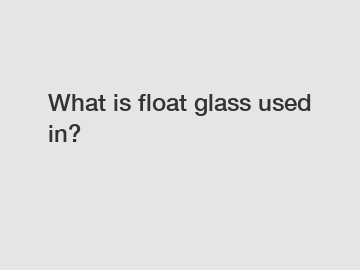Nov. 25, 2023
Construction
What is float glass used in?
Float glass, a versatile material widely used in various industries, holds immense importance in our daily lives. From construction and automotive to electronics and interior design, float glass finds itself at the heart of numerous applications. But what exactly is float glass used in? Let's explore its diverse uses and the benefits it brings to these industries.
1. Architecture and Construction:

Float glass plays a vital role in the construction industry, contributing to both aesthetic appeal and structural integrity. It is extensively used for windows and doors. Its transparency allows abundant natural light to enter buildings, providing a comfortable and pleasant space for occupants. Additionally, float glass can be laminated or toughened, enhancing safety and security. It is also employed for building façades, balustrades, office partitions, and even flooring in the form of durable glass tiles.
2. Automotive Industry:
The automotive industry heavily relies on float glass for the manufacturing of windshields, door windows, and rear-view mirrors. The exceptional clarity of float glass ensures optimal visibility while driving, improving safety on the road. Moreover, float glass is used as laminated glass in windshields, protecting occupants from potential injuries caused by shattered glass fragments in case of an accident.
3. Electronics and Technology:
In the world of electronics, float glass is employed for the production of touch screens, LCD screens, and display panels. Its smooth surface and high light transmission capabilities make it ideal for these applications. Additionally, float glass can be chemically strengthened to increase its resistance to scratches and impacts, prolonging the lifespan of electronic devices.
Suggested reading:4. Interior Design and Home Decor:
Float glass captivates interior designers and homeowners with its versatility and aesthetic appeal. It can be used to create sleek and modern glass furniture pieces like tables, shelves, and cabinets. Additionally, float glass is used for mirrors, shower screens, and glass balustrades in staircases, adding a touch of elegance to any space. It also finds its application in glass artwork, such as sculptures and decorative panels.
5. Solar Energy Systems:
Float glass plays a crucial role in the production of solar panels, which harness and convert sunlight into usable electricity. The pristine clarity and transparency of float glass allow maximum sunlight penetration to reach the solar cells, optimizing energy conversion. Its durability ensures long-lasting performance even under various weather conditions.
6. Industrial Applications:
Float glass finds application in various industrial sectors. It is used in manufacturing glass jars, bottles, and containers for storing food and beverages. The flat and smooth surface of float glass also makes it suitable for the production of mirrors and reflective coatings. Furthermore, it serves as a base material for the production of painted, coated, and laminated glass, meeting diverse industrial needs.
In conclusion, float glass boasts a wide range of applications across different industries. Its versatility, transparency, and durability make it an indispensable material for architecture, construction, automotive, electronics, interior design, solar energy, and industrial sectors. Whether we are driving on the road, admiring a beautiful glass artwork, or relying on solar power, float glass is silently working behind the scenes, enriching our lives and enhancing various facets of human progress.
If you are looking for more details, kindly visit glass for household appliances, what is the difference between flat glass and float glass, silk screen advertising.
Further reading:Related Articles
If you are interested in sending in a Guest Blogger Submission,welcome to write for us!
All Comments ( 0 )